Jun 2019 2nd Edition
Jun 2019 2nd Edition vuyelwan
Translations
20 years of service delivery excellence
20 years of service delivery excellence angenithaGovernment's Thusong programme aims to give marginalised communities access to information, services and opportunities.
For the past 20 years, Thusong service centres have been a critical driving force for change in South Africa. 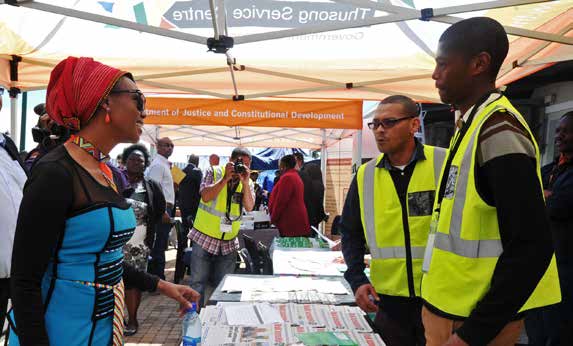
Implemented in 1999, the programme is this year celebrating 20 years of providing service delivery to previously underprivileged communities.
Thusong service centres are one-stop hubs that aim to empower the poor and disadvantaged through access to information, services and resources from government, non-governmental organisations, parastatals, businesses and other enterprises, so that they are aware of the opportunities available to improve their lives.
The centres are largely located in peri-urban areas and townships, with a specific focus on rural areas.
Currently, there are 131 operational Thusong centres across the country, providing the following services:
- Applications for identity documents and birth, death and marriage certificates,
- Applications for services are offered by the South African Social Security Agency (SASSA),
- Information on entrepreneurship, and
- Information on National Youth Development Agency services.
In addition, communities can obtain copies of the government newspaper, Vuk’uzenzele; learn more about the imbizo programme; and listen to regular community radio programmes that allow for interaction between government and South Africans.
Did you know
Annual Thusong Week is celebrated from 16 – 20 September.
For more information, please visit www.thusong.gov.za or call 012 473 0338.
Africa’s queen of the skies
Africa’s queen of the skies tsoanaMajor Mandisa Nomcebo Mfeka has been reaching for the skies since the age of five, when she watched her first airshow.
Today, she is Africa’s first female fighter jet pilot, flying for the South African Air Force (SAAF) during the nation’s most prestigious events, including the recent inauguration of President Cyril Ramaphosa.
Born in Ntuzuma, KwaZulu-Natal, Major Mfeka became fascinated with aviation when her mother first took her to an airshow at the Virginia Airport in Durban. At that stage, she had no idea that she would one day take to the skies herself.
When she was 16, however, her life changed forever. 
“I was researching careers in maths and science and saw a SAAF advert, outlining the requirements to be a pilot or navigator. I realised that I could potentially have a career in aviation and was so excited that I couldn’t sleep,” said Major Mfeka, who is now 29 years old.
Straight after graduating from high school, she joined the air force in 2008 as an airman. She officially achieved her SAAF wings in 2011, and progressed quickly through the ranks to become a qualified pilot and then captain. Today, she holds the esteemed rank of major and flies the British-made Hawk Mk120 from the Airforce Base Makhado in Limpopo.
Flying above gender and race barriers
Major Mfeka is humble about the incredible achievement of being the first female black African fighter jet pilot.
“I know I am representing a lot of people, but I have achieved this because this is the direction I wanted to go. At the SAAF, I have been surrounded by people who are professionals, people who are ambitious and want to be the best, so I wanted to embody that and be an expert in my career,” she said.
Major Mfeka added that she hasn’t felt intimidated by the male-dominated nature of the field.
“I just had to be more assertive and grow a thicker skin emotionally,” she said, adding that she sometimes outperformed the men in training or on the academic front.
Soaring higher
Major Mfeka has flown jets at some of South Africa’s most prestigious events. A few years after getting her wings, she was tasked with flying at the funeral of former President Nelson Mandela.
She also fondly remembers being part of a flying formation for Freedom Day in Port Elizabeth, which was led by one of her idols.
“The lead plane was flown by Colonel Musa Mbhokota, who was the SAAF’s first black fighter jet pilot. He is somebody I look up to very much and I draw such inspiration from him, so it was an honour flying in formation with him.”
Mfeka’s biggest dream is to become the commander of a Gripen jet, the SAAF’s premier fighter jet.
“When I see myself flying that jet, I get extremely excited. I would be so honoured if I could reach that milestone – it would be a dream come true.”
Message for Youth Month
Major Mfeka said that the youth should never let their circumstances stand in the way of becoming a success.
“Your dreams and passions are an indication of what you can achieve and what you can become. Your potential is not determined by your background. Some people from very impoverished areas have achieved really great things; they did not let their circumstances dictate to them what their life was going to be like.”
Apply for agricultural funding in NW
Apply for agricultural funding in NW JoyCommercial farmers, entrepreneurs and previously disadvantaged individuals, among others, living in the North West have been encouraged to apply for funding for agricultural projects.
The North West Department of Agriculture and Rural Development in conjunction with the National Department of Agriculture, Land Reform and Rural Development have opened applications for financial aid for agricultural and rural development projects.
The department calls on organised agriculture, including small holder and commercial farmers, entrepreneurs, previously disadvantaged individuals (youth, women and people with disabilities), traditional leaders, schools, churches, and cooperatives in the North West to apply for funding for the 2020/21 financial year.
The department said the funding of projects aims to realise the National Development Plan’s (NDP) vision 2030 of addressing the triple challenges of poverty, inequality and unemployment, as well as positively contribute to food security, job creation, and economic growth.
The department has prioritised the programmes to be funded. These include crop/ grain production, livestock production, horticulture production and aquaculture.
Funding consideration is based on commodity value chain (farm-to-fork).
“Applicants should demonstrate appetite to farm and/or run a profitable business, provide proof of access to land and legislative obligations,” the department said.
The applicants may choose to be supported with one and/or combination of the following:
- On and off farm infrastructure and production inputs;
- Farmer training (skill development and capacity building;
- Enterprise business development, marketing and trade;
- Agro – processing business development support;
- Land care;
- Special programmes;
- Primary animal health care;
- Expanded public works programme (EPWP); and
- CRDP (Comprehensive Rural Development Programme) special projects.
“Interested parties can contact departmental Local Area Offices (LAOs) across the province to be assisted with application forms. Closing date for applications is Friday, 28 June 2019. No late, faxed or emailed applications will be accepted.
“Applicants will be given a reference number upon receipt of the application. The Department reserves the right to consider any application. Successful applicants will be required to enter into a funding agreement with the department in line with government prescripts,” the department explained.
For more information, contact Gontse Padi on 018 389 5420. – SAnews.gov.za
Assistance for young farmers
Assistance for young farmers angenithaFarmers can reap great rewards with the Ilima/Letsema and the Comprehensive Agricultural Support Programme (CASP).
The two programmes, run through the provincial agriculture and rural development departments,s offer small scale farmers support so they can improve their farming projects, livestock and plant farming production support. 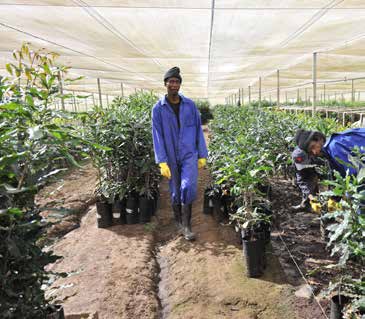
The aim of programme is for the government to ensure that people are producing food in a bid to fight poverty and under-development as well as stirring up rural economic development through agricultural programmes.
Farmers who want to benefit from the programmes however have to go through several steps.
What are the products and services offered by Illima/Letsema?
The programme offers revitalisation of irrigation schemes, household gardens, school, community and public gardens, livestock purchasing and hectares planting mechanisation.
Who may apply?
- Smallholder farmers
- Land and agrarian reform beneficiaries
- Farm workers
- Small agribusinesses
- Farmers on communal land
- Women and youth.
How to apply?
Contact the CASP or Ilima/Letsema Coordinator in your province for further details.
What is the selection criteria for being part of the Ilima/Letsema programme?
- You must be a South African citizen
- Be from a historically disadvantaged group
- Should be a black a South African applicant (Indian, Coloured, and Chinese included)
- Must be 18 years or older
- Access to services (water, electricity etc.)
- Applicants should indicate their educational levels, qualifications, experience in running the enterprises and skills levels of the different labour categories.
What are the required documents?
- Identity Document
- Proof of address
- Proof of legal access to land
- Proof of access to water rights where applicable.
Building a better future for our youth
Building a better future for our youth tsoanaUnion Buildings
Youth Month is celebrated every year in June to pay homage to the brave spirit of South African youth who took to the streets on 16 June 1976 to fight against the use of Afrikaans as a medium of instruction in our schools. I believe that the same fighting spirit still lives in the new generation of young people, who are now fighting against the scourge of poverty, unemployment and inequality. 
These young people who have insatiable aspirations for a better life, demonstrated their steadfastness and forbearance when they came together to call for free tertiary education.
The achievement of a stable and successful South Africa with an inclusive economy is uppermost on the agenda of government to ensure a better life for all. We have and will continue redoubling our efforts to develop and empower youth to be able to contribute to growing our country.
Despite making up the majority of South Africa’s population, youth continue to bear the brunt of unemployment, poverty and inequality. They remain the hardest hit by disease, violent crime, drug abuse and underdevelopment.
As a caring government, we are working hard to ensure that young people acquire skills and experience, and also receive the necessary support to enter the world of entrepreneurship as job creators rather than jobseekers.
Last year, I launched the Youth Employment Service (YES) programme, which aims to prepare young people for employment and provide them with the technical skills needed to underpin the industrialisation of the economy.
The YES programme is a joint effort by government, labour and business to offer paid-work experiences to one million South African youth over the next three years. According to research, out of 15.5 million people aged between 18 and 34 in South Africa, 5.8 million are unemployed.
With a number of large companies already involved, the YES initiative has so far managed to secure 17 000 work opportunities for unemployed youth.
For young people who have entrepreneurial aspirations, government established the National Youth Development Agency, which offers skills development training, development finance, mentorship, support and market linkages.
More than 2 500 start-up companies have since been provided with funding, creating more than 10 000 jobs in the economy.
If we are to make the most of the partnership between government and the private sector, we need to ensure that young South Africans are properly equipped to participate in all sectors of the economy. That is why we are investing in the education of our youth.
We are resolute to ensure that all children, regardless of their circumstances, are not denied access to quality education. This is being complemented by our endeavour to improve the quality of teaching and learning in our schools and tertiary institutions.
Earlier this year, the Department of Higher Education and Training announced the allocation of R967 million for the payment of fees for students owing ‘historical debt’.
This money will assist students who owed fees from the previous year by ensuring that the debt does not prevent them from accessing tertiary education.
With all the investments made by government for their empowerment, youth must also play their part in growing South Africa. They must be preoccupied with activities that contribute to making the country a better and safer place for all to live in. Some of our young people are engaged in awe-inspiring projects, small businesses and farming in their communities. They have taken a proactive decision to play a meaningful role in taking the country forward and growing the economy. We must encourage more young people to look at ways of using their talents and skills to start their own businesses and create jobs.
Such a noble responsibility involves abstaining from alcohol and drug abuse, and also not participating in crime and corruption.
And more importantly, young people must keep themselves safe from HIV and other sexually transmitted illnesses by using a condom, abstaining from early sexual activity and getting tested regularly.
The future of South Africa lies in the hands of the youth who are committed to building a society that is different from the one that the youth of 1976 come from. Let us work together to secure a better future for our youth.
Closing the skills gap
Closing the skills gap vuyelwanA Hammanskraal entrepreneur is committed to transferring his skills as a potter to youngsters in his community so that they too can generate an income for themselves.
Mduduzi Matsane (33) believes that anybody who has skills that they can transfer to unemployed people in their communities, should do so in order to curb unemployment. 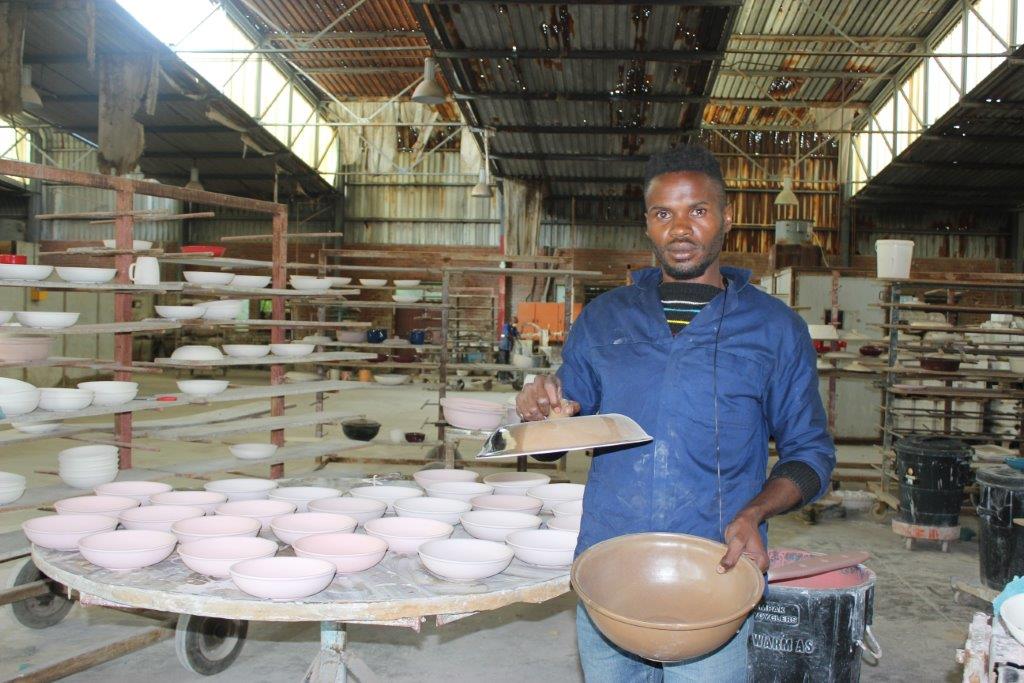
He is the owner of Canosa Ceramic Factory that operates from the Babelegi Industrial Park in Hammanskraal, north of Pretoria, which is run by the North West Development Corporation.
The company manufactures ceramic tableware and sells it to local residents and businesses.
It all started in 2012 when Matsane decided to put his pottery skills to good use.
“My father is a potter. I used to watch him make African calabashes and one day he took me under his wing and showed me how pottery works. I was so interested in it that I later advanced my skills a little bit in order to manufacture modern ceramic products as well,” Matsane said.
About seven years ago, while he was volunteering at a local old age home, he was offered space to design his own African calabashes, like his father.
“At that time, the City of Tshwane saw my work and was interested in what I was doing. They arranged space for me to work at a training centre very close to my home and I worked from there until around 2015,” he said.
He also found time to train 30 youngsters from Hammanskraal.
Today, 10 of them work with Matsane at the factory he acquired at the end of 2015. He said the company has so far managed to create close to 25 direct and indirect jobs.
“If we could address challenges such as the skills gap in our societies, people would be empowered to start their own businesses and create jobs for other people,” he said.
The company buys raw material from nearby mines and the manufacturing process takes about seven days. Canosa’s products include mugs, cups, bowls, plates and other tableware.
The biggest challenge facing the business is not being able to access funding to buy equipment and to upgrade the factory, which would result in the creation of more jobs.
Combating sexual harassment in universities
Combating sexual harassment in universities vuyelwanThe Department of Higher Education and Training has appointed a Ministerial Task Team to advise on matters relating to sexual harassment and gender-based violence (GBV) in public universities in South Africa.
This follows an open letter written by a group of academics to the Minister in March 2019 highlighting issues of Gender – Based Violence (GBV), including sexual harassment.
Among the issues raised by academics were lecturers, especially male lecturers, who asked for sexual favours from students for marks. 
According to the academics, young female academics also get harassed by senior leadership in universities in exchange for job security.
In a letter, the academics called on the Department of Higher Education and Training to ensure that steps are implemented to help prevent sexual harassment and sexual violence in university spaces.
The academics recommended the following:
- A special investigation be conducted into the extent of sexual offences directed at both staff and students in the higher education sector;
- A register of offenders be published on the department’s website for all higher education institutions to access and consult before posts are offered to new staff members;
- Standardising the resources of offices dealing with sexual offences in higher education institutions, taking into account the size of each institution;
- Blacklist those found guilty of sexual offences to prevent them from joining any institution of higher learning after their guilt is determined;
- Establishment of a charter of ethics that would be signed by all staff and students who assume positions of leadership in higher education institutions, and
- Instituting quarterly reports through which all vice-chancellors disclose statistics on sexual offences collected in various institutions.
In response to this, the Department of Higher Education met with a group of academics to discuss the proposals made.
The Ministerial Task Team will advise the Minister and the department on the following matters:
- The effective introduction and implementation of the policy framework to address GBV with a specific focus on universities;
- A possible enquiry into sexual harassment, GBV and gender-based harm in the university sector, considering work that has already been carried out;
- Measures to ensure that sexual offenders do not escape justice and repeat offences in other institutions;
- Appropriate levels of support to be put in place at public universities;
- Mechanisms and processes to report on sexual offences in the sector, in line with the policy framework, with a view of improving monitoring and reporting; and
- Other possible interventions to improve institutional responses to gender-based violence and sexual harassment.
“The task team will also be requested to identify areas of good practice in reporting and managing gender-based harm and support mechanisms that could be replicated in the sector, and identify policy weaknesses across institutions that may be contributing to failures of institutions to adequately manage sexual harassment and gender-based violence,” the Minister said.
The nine-member team includes Lisa Vetten, Dr Babalwa Magoqwana, Professor Jackie Dugard, Professor Pumla Gqola, Dr Robert Morrell, Jerome September, Professor Malehoko Tshoaedi, Corinne Knowles, and a Student Representative nominated by the South African Union of Students (SAUS).
The task team is appointed for a period of 12 months, starting in June 2019.
Community members proud of high-tech new library
Community members proud of high-tech new library UrsulaThe Western Cape is focused on creating a library service that is free and accessible to all in order to promote a culture of reading, library usage and lifelong learning.
 Residents of the township of Dunoon outside Cape Town previously had to travel almost 10 kilometres to reach their nearest library. Today, they are proud custodians of one of the most high-tech libraries in the province, following the opening of the R42 million Dunoon Library.
Residents of the township of Dunoon outside Cape Town previously had to travel almost 10 kilometres to reach their nearest library. Today, they are proud custodians of one of the most high-tech libraries in the province, following the opening of the R42 million Dunoon Library.
Housed in a large, modern building, the library is part of a new integrated development precinct undertaken by the City of Cape Town, the Western Cape Department of Cultural Affairs and Sport and the national Department of Arts and Culture.
Some of its outstanding features include two SmartCape sections which provide access to digital resources; over 15 000 library items in various sections; study areas; music listening pods; community meeting facilities and free Wi-Fi access. The building is also energy and water efficient, using grey water recycling and LED motion-sensing lights.
“This initiative recognises the importance of providing high-quality learning resources to previously disadvantaged learners and the need for safe and attractive social spaces in vulnerable communities,” explained Tania Colyn, spokesperson for the provincial Department of Cultural Affairs and Sport.
After assessing the problems facing Dunoon, home to around 80 000 people, it was decided that a new integrated development project was needed in the area.
“One of the projects that was identified was the development of a learning and innovative precinct. The library is a link to the schools, the sports complex, the recreation hall and the early childhood development centre,” said Colyn.
Dunoon resident Friedel Afrika (46) said that the new library is something for the community to be proud of.
“It is such a beautiful building from the outside, we never expected that we would have something like this here. We usually have to go all the way into the city,” said Afrika, adding that he hoped the library would solve some of the issues facing the community.
“We have many children who don’t go to school and they wander the streets and do drugs. Now that there is a proper learning space for them and everyone to go to, I hope they will use the opportunity to better their lives.”
Dancing to the world
Dancing to the world Ursula Oscar Buthulezi (28) has danced his way to choreographing award-winning international performances on stages around the world.
Oscar Buthulezi (28) has danced his way to choreographing award-winning international performances on stages around the world.
Raised by a single taxi driver father in Vosloorus in Gauteng, Buthelezi says among his community dance was not viewed as a proper career choice for young boys.
However, when he was six-years-old he discovered a youth club where young people were performing Pantsula a township dance and traditional African dances.
“I fell in love with dance and for 13 years I was involved at the youth club, dancing and choreographing at the same time,” says Buthelezi.
After completing matric in 2009, he enrolled with the Moving into Dance training college based in Newtown in Johannesburg to perfect his talent.
While at the school he expanded his dance and choreography skills by getting involved in Afro-fusion, contemporary and ballet dancing.
Shortly after graduating at the college, Buthelezi began working for Moving into Dance.
In 2016, he scooped his first two international awards at the Kurt Jooss International Award for Choreography.
This award was for choreographing and performing in “ROAD”, a duet which is based on living life as a single father. He became the first ever African to win this prestigious award.
“The award opened a lot of doors for me here at home and internationally” said Buthelezi.
In 2017, Buthelezi worked on the South African staging of The Colour Purple, which has toured to six countries and won multiple awards.
In 2019, the musical won seven awards at the Naledi Theatre Awards, with Buthelezi winning Best Original Choreography.
Buthelezi's biggest achievement in his career is being nominated at the 33rd International Competition for Choreographers in Germany, which takes place on 21 and 22 June.
Despite his incredible international success, Buthelezi remains passionate about South Africa and the youth.
“I visit schools to do something I call Edu-Dance, which tries to take what the kids learn during theory at school and translate it into movement so that they can understand it in a more practical way,” says Buthelezi.
“Whenever I create works, I try to focus on issues in our country. Like women abuse, drug abuse or politics. I want my work to touch and heal people,” he said.
Eastern Cape school better equipped to teach
Eastern Cape school better equipped to teach tsoanaThe state-of-the-art-computers donated to a small school in Mama Albertina Sisulu’s home village will open up a world of opportunity for the learners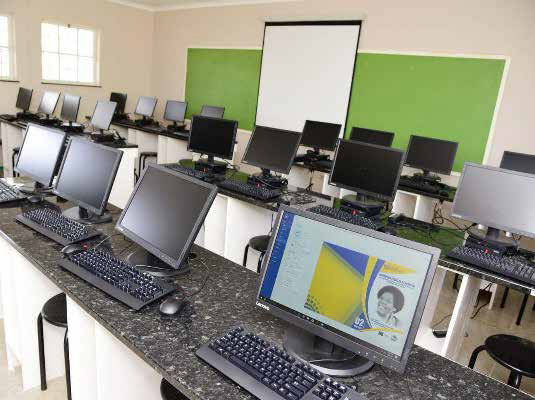
Pupils of a rural school in the Eastern Cape rejoiced when their school was given a facelift and received computers.
The 213 pupils of Albertina Sisulu Senior Primary School in Xolobe village in Tsomo, will benefit from the donation of 30 computers, refurbishments and safer classes, thanks to the Industrial Development Corporation (IDC) and the Eastern Cape Department of Education.
“The pupils had to share the old computers we had but now they will be able to work on their own and easily become computer literate,” said the school’s principal, Nomfuneko Somlotha.
She said the pupils will be better able to access information for their school work and for research, whereas before they relied only on textbooks. “Visual learning is important because it is easier to remember something that you have seen,” Somlotha told Vuk’uzenzele.
She said the equipment would also help speed up teaching because pupils could be referred to websites as another mode of learning. The school was also given added security and furniture upgrades.
Somlotha said the school will use the donated equipment to develop pupils’ knowledge beyond the classroom and to open their eyes to the many careerpaths available to them.
For the love of food
For the love of food Ursula In some way or the other we are all foodies at heart and it shows when we whip up our favourite midweek dishes. There’s nothing better than seeing our loved ones sitting around the table digging into the hearty meal you have prepared. Here is a delicious dish that your family is sure to enjoy.
In some way or the other we are all foodies at heart and it shows when we whip up our favourite midweek dishes. There’s nothing better than seeing our loved ones sitting around the table digging into the hearty meal you have prepared. Here is a delicious dish that your family is sure to enjoy.
Meatballs and spaghetti
Ingredients:
- Meatballs
- 1 kg minced beef
- ½ onion (finely diced)
- 2 garlic cloves (minced)
- ¼ cup fresh parsley (finely chopped)
- 1 tsp salt
- 1 tsp black pepper
- 1 large egg
- ¼ cup panko breadcrumbs
- 2 tbsp oil
Sauce
- 6 tomatoes (chopped)
- ½ onion (chopped)
- 2 garlic cloves (chopped)
- ¼ cup fresh basil (chopped)
- 1 tsp salt
- 1 tsp black pepper
- ¼ cup Mrs Ball’s chutney
- ½ cup tomato sauce
- 1 packet spaghetti
Directions:
Meatballs
In a mixing bowl, add the onion, garlic, egg, breadcrumbs and parsley. Mix together and set aside for 10 minutes. Add the minced meat, salt and black pepper to the mixture and mix with your hands. The mixture should be wet, but not runny. Once done, set aside for 10 minutes. With your hands, scoop up mixture and form golf ball size meatballs. Place a pan on medium heat on the stove and add oil. Sear the meatballs all round but do not cook through. Remove from the pan and let them rest on a plate.
Sauce
Blend together the tomatoes, onion, garlic, chutney, tomato sauce, salt and pepper. Blend until a smooth sauce is formed. Add the sauce to pan that the meatballs were fried in and let simmer for five minutes on medium heat. Add in the meatballs and let simmer for 15 minutes until sauce is infused in the meatballs.
Serve with spaghetti.
Full marks for Mpumalanga tutor
Full marks for Mpumalanga tutor Ursula Every child learns at his or her own pace.
Every child learns at his or her own pace.
Having noticed this, Khosi Mthimkhulu (31) was inspired to start an academy called Our Kids Are Smart in Elukwatini in Mpumalanga to help struggling students.
She said that the lack of tutors in the area meant her business quickly took root.
“A lot of kids are struggling with homework because their parents are either working or are not there after school. Sometimes, they live with their grandmothers, who may not be educated,”she said.
The academy started in 2018 with 35 pupils, and Mthimkhulu said there has been a marked improvement in their results.
She said tutoring is offered in all subjects to pupils from grade one to nine.
“I teach almost everything myself except Siswati, which I did not study.”
Mthimkhulu said her pupils use Vodacom e-school learning material, which has been developed by expert teachers and in line with Curriculum and Assessment Policy Statement (CAPS). The tutor explained that e-school is a collaboration between the cellphone network provider and the Department of Basic Education to make the syllabus available through cellphones.
Mthimkhulu said she keeps up with the programme and ensures she always has the latest CAPS-aligned textbooks.
The aspiring teacher has received assistance from the Small Enterprise Development Agency (Seda) and the National Youth Development Agency (NYDA), which has helped her grow her busines's profit margin by 91 percent.
Mthimkhulu approached the two organisations after learning about them at a workshop.
“Seda helped me with branding while the NYDA helped me with a grant,” she said, adding that she used the money to buy desks and other equipment. 
If you need more information about Seda call 0860 103 703. For information about receiving grant funding from the NYDA, call 0800 52 52 52.
Government support grants farmer his dream
Government support grants farmer his dream angenithaA crop farmer is taking advantage of government’s agricultural programmes to do his bit for food security and empower himself and his community.
The child of farm workers, Gil Wilson (35) has gone on to become a maize farmer with workers of his own.
His farm, in the agricultural town of Jan Kempdorp in the Northern Cape, is set to increase its maize production from 188 tons last year to 266 tons this year, all thanks to support he received from the Comprehensive Agricultural Support Programme (CASP) and other government initiatives. 
The CASP aims to facilitate agricultural development by targeting beneficiaries of land reform, restitution and redistribution, and other black producers who have acquired land through private means.
In 2016, Wilson received a farm through a lease from the Department of Rural Development and Land Reform, after going through a lengthy application process with the national department. The lease is renewable every six months.
He was then given a leg-up by the Northern Cape Department of Agriculture, Land Reform and Rural Development, which donated 38 bags of maize seed and 190 bags of wheat seed, each weighing 25 kilograms. More recently, a tractor donated through the CASP and 300 50-kilogram bags of fertiliser have given him another boost.
Wilson has a water-rights contract with the Department of Water and Sanitation. “I irrigate three times a week and pay R1 300 for the month,” he said.
The former construction worker said the 38-hectare farm has helped him create jobs in the community. He has hired five people, with two of them being permanent. The farmer said he wants to grow from being a small-scale farmer into a commercial farmer so he can create more jobs for young people.
Currently, his maize is sold to agricultural company Senwes.
He said young people should enter the agricultural sector so that they can be drivers of the economy but cautions that they should be prepared to work hard.
“Commit yourself. Be passionate. Farming is not simple. It’s very tough – you must be a hard worker and really know your story.”
Improving healthcare services in the North West
Improving healthcare services in the North West angenithaA tertiary hospital in Klerksdorp has expanded its complement of specialist clinicians by 13, which means state patients can look forward to a better level of healthcare.
The quality of healthcare in the North West is set to improve following the recent appointment of 13 specialists at Tshepong hospital in Klerksdorp.
The new specialists comprise a cardiologist, cardiothoracic surgeon, gynaecologist, plastic surgeon, neurosurgeon, general surgeon, maxillofacial surgeon and nephrologists.
“We strategically recruited these clinicians because they are indeed solution providers to the health problems we experience in the province,” said North West Health MEC Madoda Sambatha.
He said the appointments were made possible by the hospital’s strategic alliance with the Witwatersrand University Medical School.
The MEC said the provincial health department must optimise public services to ensure that greater numbers of people are able to access quality healthcare.
The hospital was upgraded from a regional hospital to a tertiary one, which means it no longer only services the Dr Kenneth Kaunda District but the entire province.
It is the largest referral hospital in the province and is able to accommodate 900 inpatients at district, regional and tertiary level.
Professor Binu Luke, who is the chief specialist physician and tertiary services co-ordinator at the hospital, said beefing up the clinical specialist structure will enable patients who rely on the public health sector to enjoy better quality care and benefit from in-depth medical expertise.
Prof Luke was involved in the recruitment of the specialists.
Hospital CEO Polaki Mokatsane said the hospital has positioned itself as a provincial leader in efficient and effective clinic intervention, management and quality patient care.
“The hospital has since the year 2000 implemented a strategy to increase the number of tertiary hospital-based services available,” said Mokatsane.
The major clinical departments include:
Internal Medicine: The largest department with 341 inpatient medical beds. The department manages two ICUs; the cardiology, renal and MDR/XDR TB units; and the Wellness Clinic. It caters for approximately 5 400 outpatients per month.
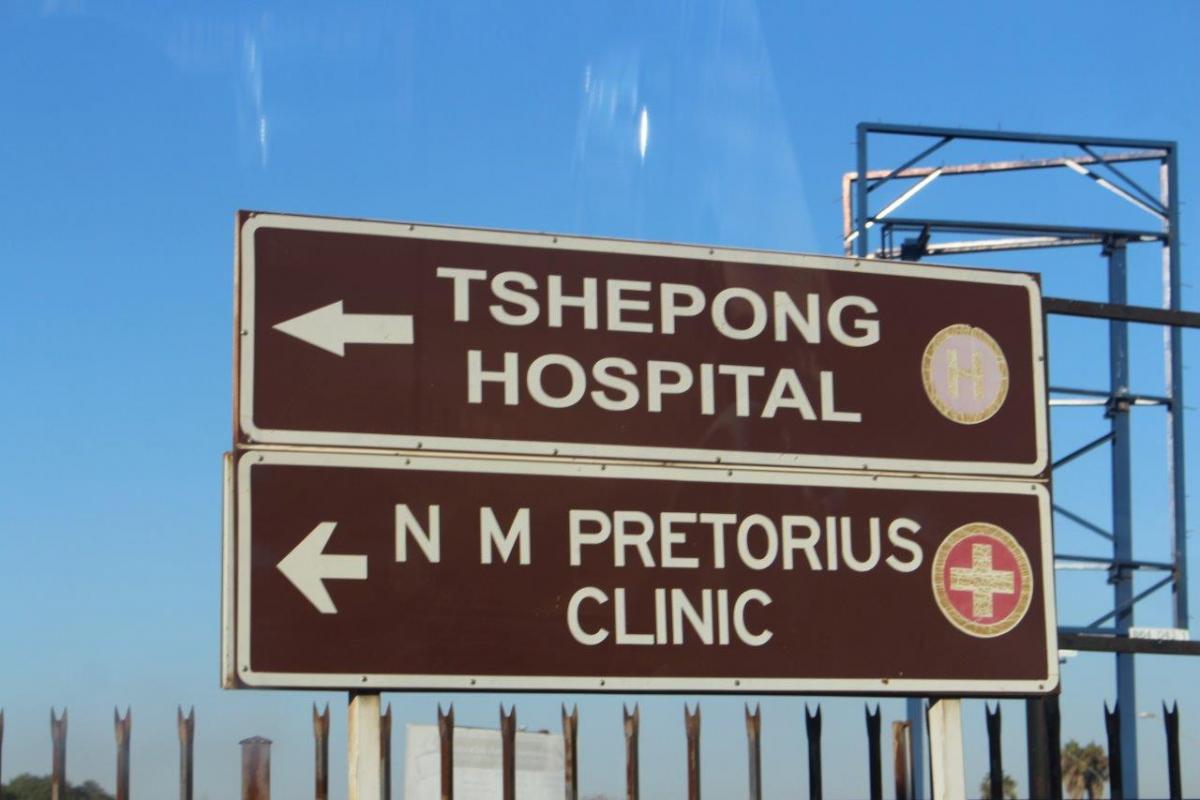 General Surgery: 159 inpatient beds and around 1 750 outpatients per month.
General Surgery: 159 inpatient beds and around 1 750 outpatients per month.
Paediatrics Department: The 68-bed department includes a general ward and neonatal unit, with ventilator facilities for 10 babies. It sees approximately 1 240 outpatients per month.
Orthopaedics Department: 77 beds, serving approximately 1 620 outpatients per month.
Obstetrics & Gynaecology: 72 beds, serving around 500 mostly high-risk deliveries per month. The department also serves approximately 550 gynae cology outpatients per month.
In 2017, the hospital was overall first runner-up in the Centre for Public Service Innovation Awards in the category: Innovative service delivery institution.
This was all thanks to the hospital’s oncology unit for rendering excellent and innovative services to help cancer patients.
“Oncology services have over time demonstrated tangible improvement in the quality of life of cancer patients,” said Mokatsane.
Some of the innovations implemented by the hospital include :
- computerised imaging services for treatment planning and diagnostic purposes;
- a daily clinic for the review of post-treatment cancer patients; and a
- brachytherapy machine to boost cancer treatment and stop bleeding in emergency services.
The hospital also has the province’s only neurosurgery department, which has successfully treated all varieties of diseases and disorders involving the brain and spine.
Jobs: Department of Labour - Jun 2019
Jobs: Department of Labour - Jun 2019 UrsulaDirector: ESSA Development Management
Directorate: ESSA Development Management
Centre: Head Office
Reference No: HR4/19/06/01HO
Salary: All inclusive: R 1 005 063 per annum
Enquiries: Mr. Sagren Govender, Tel: (012) 309 4141. Head office, Chief Director: Human Resources Management: Private Bag X 117, Pretoria, 0001
Assistant Director: Financial Planning
Directorate: Financial Management
Centre: Head Office
Reference No: HR 4/19/06/02 HO
Salary: Commencing: R376 596.00 per annum
Enquiries: Mr. D Kyle, Tel: (012) 309 4298. Head office, Chief Director: Human Resources Management: Private Bag X 117, Pretoria, 0001
Deputy Director: Public Employment Services
Centre: Provincial Office: Northern Cape
Reference No: HR4/4/8/14
Salary: All inclusive: R 869 007.00 per annum
Enquiries: Mr. A Senakhomo, Tel: (053) 838 1545. Provincial Office, Chief Director: Provincial Operations: Private Bag X 5012, Kimberly, 8301
Assistant Director: Public Employment Services (Re-advertisement)
Centre: Provincial Office: Eastern Cape
Reference No: HR/4/4/1/110
Salary: Commencing: R470 040 per annum
Enquiries: Ms. KD Mogotloane, Tel: (043) 701 3074. Provincial Office, Chief Director: Provincial Operations: Private Bag X9005, East London, 5200
Assistant Director: COID
Centre: Provincial Office: Mmabatho
Reference No: HR 4/4/9/73
Salary: Commencing: R470 040 per annum
Enquiries: Ms. C Mbaba, Tel: (018) 387 8100. Chief Director: Provincial Operations: Private Bag X 2040, Mmabatho, 2735
Counsellor
Labour Centre: Vredenburg
Reference No: HR4/4/10/190
Grade 1: R579 147 - R642 765 (OSD)
Grade 2: R662 190 – R734 928 (OSD)
Grade 3: R750 024 – R832 398 (OSD)
Enquiries: Ms. Z Maimane (021) 441 8125
PROVINCIAL OFFICE
Chief Director: Provincial Operations: PO Box 872, Cape Town, 8000
Assistant Director: UI Operations
Centre: Provincial Office: Western Cape
Reference No: HR 4/4/10/117
Salary: Commencing R 470 040 per annum
Enquiries: Ms. Z Maimane, Tel: (021) 441 8125. Provincial Office: Chief Director: Provincial Operations: PO Box 872, Cape Town, 8000
Workshop Team Leader (3 posts)
SEE: Seshego Factory - Polokwane – Wood, Metal, Textile- HR 4/19/06/05 (1 post)
SEE: Silverton Factory - Pretoria – Wood, Metal, Textile- HR 4/19/06/06(1 post)
SEE: Rand Factory-Johannesburg-Textile Ref No: HR4/19/06/07(1 post)
Salary: Commencing: R 376 596 per annum
Enquiries: Ms. A Pretorius, Tel: (012) 843 7300. Head ofice, Chief Director: Human Resources Management: Private Bag X 117, Pretoria, 0001
Closing date for applications: 2 July 2019 at 16:00
For full details of the advertised posts visit our website: www.labour.gov.za
Applications must be submitted on a Z83 form, obtainable from any Public Service Department or on the internet at www.gov.za/documents. The fully completed and signed form Z83 should be accompanied by a recently updated, comprehensive CV as well as recently certified copies of all qualification(s), academic records including a Senior Certificate and ID-document [Driver’s license where applicable](Certified copy of a copy will not be accepted). The certification must be within three (3) months as at the advert closing date. Non-RSA Citizens/Permanent Resident Permit Holders must attach a copy of their Permanent Residence Permits to their applications. Should you be in possession of a foreign qualification, it must be accompanied by an evaluation certificate from the South African Qualification Authority (SAQA) including Matric. Applicants who do not comply with the above-mentioned requirements, as well as applications received late, will not be considered. The Department does not accept applications via fax or email. Failure to submit all the requested documents will result in the application not being considered. Correspondence will be limited to short-listed candidates only. If you have not been contacted within eight (8) weeks after the closing date of this advertisement, please accept that your application was unsuccessful. Suitable candidates will be subjected to a personnel suitability check (criminal record, citizenship, credit record checks, qualification verification and employment verification). Where applicable, candidates will be subjected to a skills/knowledge test. All shortlisted candidates for SMS posts will be subjected to a technical competency exercise that intends to test relevant technical elements of the job, the logistics of which be communicated by the Department. Following the interview and technical exercise, the selection panel will recommend candidates to attend generic managerial competencies using the mandated DPSA SMS competency assessment tools. Successful candidates will be appointed on a probation period of 12 months. The Department reserves the right not to make any appointment(s) to the above post. The successful candidate will be expected to sign a performance agreement. The Department of Labour is an equal opportunity affirmative action employer. The employment decision shall be informed by the Employment Equity Plan of the Department. It is the Department’s intention to promote equity (race, gender and disability) through the filling of this post(s) with a candidate whose transfer / promotion / appointment will promote representativity in line with the numerical targets as contained in our Employment Equity Plan.
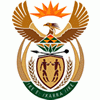
Jobs: The Department of Justice and Constitutional Development - Jun 2019
Jobs: The Department of Justice and Constitutional Development - Jun 2019 UrsulaDeputy Director: Quality Assurance
Ref No: 69/19EC
Centre: Regional Office, East London
Salary: R733 257 - R821 052 per annum (All inclusive remuneration package). The successful candidate will be required to sign a performance agreement.
Requirements: Three year Bachelor`s Degree /National Diploma in Public Administration or equivalent; 3 years management experience of which 3 years’ experience in office and district administration; A valid driver’s license; knowledge of public Service Regulations, and PFMA, Knowledge of departmental finance instructions, prescripts and delegations. Knowledge and experience in office and court administration will be added as advantage.
Enquiries: Mr. P Hattingh : (043) 702 7000
Deputy Director: Supply Chain Management.
Ref No: 2019/17/MP
Centre: Regional Office, Mpumalanga
Salary: R733 257 - R821 052 per annum (All inclusive remuneration package). The successful candidate will be required to sign a performance agreement.
Requirements: A National Diploma and / or BCom in Public Finance/Accounting/Cost & Management Accounting/Economics and other Finance related qualification. A relevant postgraduate qualification will be an added advantage. 5 years working experience in Supply Chain Management of which 3 years must be at a junior management level (preferably at Assistant Director Level). A valid driver’s license is a prerequisite. Knowledge and understanding of PFMA, Treasury Regulations, BBBEE, PPPFA,PSR, PSA and other relevant prescripts.
Enquiries: Mr SP Shabangu (013) 753 9300
Court Manager (6 Posts)
Ref No: 34/19/WC, Centre: Magistrate Office: Atlantis
Ref No: 35/19/WC: Centre: Magistrate Offce: Oudtshoorn
Ref No: 36/19/WC: Centre: Magistrate Office: Strand
Ref.No: 71/19ec: Centre: Magistrate, Office: Aliwal North
Ref No: 70/19ec: Centre: Magistrate, Office: Bizana
Ref No: 19/66/KZN Centre: Magistrate’s; Office: Msinga:
Salary: R470 040 – R553 677 per annum. The successful candidate will be required to sign a performance agreement.
Requirements: Three (3) year qualification in Administration (NQF level 6) and / or National Diploma in Services Management (NQF level 5) plus the module on Case Flow Management or equivalent qualification; At least 3 year’s managerial or supervisory experience; Knowledge and experience in office and district administration; Knowledge of Public Financial Management Act (PFMA); Experience in managing Trust (Third Party Funds) and Vote Account; A valid driver’s licence; Experience in the Court environment will be an added advantage;
Enquiries: Ms R Hendricks (021) 462 5471 (Cape Town)
Enquiries: Mr. P Hattingh (043) 702 7000 (Eastern Cape)
Enquiries: Mr J.N. Mdaka (031) 372 3000 (Kwa Zulu-Natal)
Assistant Director: IT Compliance and Risk. (Contract appointment ending 30 September 2020)
Ref No: 19/75/ISM
Centre: National Office Pretoria.
Salary: R376 596 +37% per annum in lieu of benefits. The successful candidate will be required to sign a performance agreement.
Requirements: A National Diploma in Information Technology or equivalent qualification at NQF6; 3 years’ experience in an IT environment with at least 1 year focus on IT Governance and IT Risk; IT Compliance, IT Audits; Knowledge of IT Governance related methodologies, standards, processes (COBIT, ITIL, ect.).
Enquiries: Ms. M. Qhamakoane (012) 357 8646
Assistant Director: Recruitment appointment and mobility.
Ref No: 19/67/KZN
Centre: Regional Office Durban.
Salary: R376 596-R443 601 per annum. The successful candidate will be required to sign a performance agreement.
Requirements: A three (3) year National Diploma/Degree in Human Resource Management or relevant field; Three (3) years’ experience in Human Resources and one (1) year supervisory experience; Driver’s licence.
Enquiries: Mr M J. Fakude (031) 372 3000
Assistant Director: Budget
Ref No: 67/19 EC
Centre: Regional Office East London
Salary: R376 596- R443 601 per annum. The successful candidate will be required to sign a performance agreement.
Requirements: Relevant three year tertiary qualification in in Commerce, Accounting or relevant equivalent qualification; A minimum of three (3) years working experience in a financial accounting/management environment, of which a minimum of 1 year should be at supervisory/junior management level; A valid driver’s license; Knowledge of management and financial controls; Comprehensive knowledge of the PFMA and Treasury Regulations
Enquiries: Mr. P Hattingh (043) 702 7000
Family counsellor supervisor (Grade 1)
Ref no: 54/19/FA/WC
Centre: Office of the family advocate: Cape Town
Salary: R384 228–R445 425 per annum. (Salary will be in accordance with OSD determination) The successful candidate will be required to sign a performance agreement.
Requirements: Bachelor Degree in Social Work or equivalent qualification which allows for professional registration with the SACSSP; Professional registration with the SACSSP; A minimum of five (5) years appropriate experience in Social Work after registration as a Social Worker with the SACSSP: Social Work supervisory will be added as an advantage; Knowledge and experience in Mediation; Court experience in leading Evidence; Knowledge and application of Family Law, including Mediation in certain Divorce Matters Act, Maintenance Act and Domestic Violence Act; Children’s Act (inclusive Hague Convention on International Child Abduction); A valid drivers’ licence.
Enquiries: Adv N Britz : (021) 426 1216
Social Worker/Family Counsellor Grade 1 (Contract appointment ending 30 September 2019)
Ref No: FTC/2019/03/GP
Centre: Family Advocate: Johannesburg
Salary: R257 592 + 37% per annum in lieu of benefits. (Salary will be in accordance with the OSD determination). The successful candidate will be required to sign a performance agreement.
Requirements: Bachelor Degree in Social Work or equivalent qualification which allows for professional registration with the SACSSP (SA Council for Social Service Profession); Appropriate experience in social work after registration as Social Worker with the SACSSP; Knowledge and experience in Mediation; Court Experience in rendering expect Evidence; Knowledge and application of Family Law, including Mediation in certain Divorce Matters Act, Children’s Act, Maintenance Act and Domestic Violence Act (inclusive of Hague Convention on International Child Abduction); A valid drivers’ licence.
Enquiries: Ms. R Moabelo (011) 332 9000
Closing date: 1 July 2019
Note: Interested applicants may visit the following website: www.justice.gov.za or www.dpsa.gov.za to view the full job specification of the above positions. Applications must be submitted on Form Z83, obtainable from any Public Service Department or on the internet at www.gov.za. A Z83 form & CV must be accompanied by original certified copies of qualifications, identity document and a driver’s license where necessary. A SAQA evaluation report must accompany foreign qualifications. Applications that do not comply with the above mentioned requirements will not be considered. All shortlisted candidates for SMS posts will be subjected to a technical and competency assessment. Candidate will complete a financial disclosure form and also be required to undergo a security clearance. Foreigners or dual citizenship holder must provide the Police Clearance certificate from country of origin. The DOJ&CD is an equal opportunity employer. In the filling of vacant posts the objectives of section 195 (1) (i) of the Constitution of South Africa, 1996 (Act No: 108 of 1996), the Employment Equity imperatives as defined by the Employment Equity Act, 1998 (Act No: 55 of 1998) and relevant Human Resources policies of the Department will be taken into consideration. Reasonable accommodation shall be applied for People with Disabilities including where driver’s license is a requirement. Correspondence will be limited to short-listed candidates only. If you do not hear from us within 3 months of this advertisement, please accept that your application has been unsuccessful. The department reserves the right not to fill these positions. Women and people with disabilities are encouraged to apply and preference will be given to the EE Target.
Tel: 012 315 1111 Private Bag X81, Pretoria, 0001 Momentum Centre, 329 Pretorius Street, Pretoria www.justice.gov.za @DOJCD_ZA at DOJCD

Mother Nature inspires effective method of nurturing babies
Mother Nature inspires effective method of nurturing babies angenithaSkin-to-skin contact between mothers and their newborn infants fosters better bonding and happier, healthier babies.
South African hospitals are taking inspiration from nature to save the lives of babies born prematurely, using a practice known as Kangaroo Mother Care (KMC).
Also known as skin-to-skin care, this is a simple, cost-effective method of caring for newborn babies, where the mother uses her own body temperature to keep her infant warm. It is similar to how mother kangaroos keep their infants warm in a special body pouch.
KMC has been adopted by the Western Cape Government in all of its healthcare facilities to decrease the number of deaths amongst newborn babies.
“KMC refers to the practice of providing continuous skin-to-skin contact between mother and baby, exclusive breastmilk feeding and early discharge from hospital. KMC is an especially important intervention for babies who are born prematurely,” explains Western Cape Government spokesperson Monique Johnstone.
Trevlynn Moses (31) from Tafelsig, Mitchells Plain, went into premature labour and delivered her twin baby boys six weeks early.
“I could definitely see the benefits of KMC with my babies because their weight improved within the first three days; they were breastfeeding nicely and I really developed a strong bond with them,” said Trevlynn.
“To KMC my babies took minimal effort. My babies were dressed in just their nappies with their heads covered with a cap and placed in an upright position against my bare chest, and we were covered with a blanket for warmth.”
At Mowbray Maternity Hospital, KMC has achieved a 90 percent success rate. Karlien La Grange, an assistant nursing manager at the hospital, said that all parents with premature or underweight newborns are encouraged to use KMC.
“It is an effective way to help meet a premature baby’s basic needs for warmth, nutrition, stimulation and protection from infection. Babies who receive KMC are less stressed, you hardly hear the baby cry, better bonding takes place between the baby and mother or family member, and it improves latching and breastfeeding,” La Grange explained.
NSFAS, UIF create employment opportunities for graduates
NSFAS, UIF create employment opportunities for graduates tsoanaA new empowerment scheme will expose graduates to the work environment to better their chances of finding permanent jobs.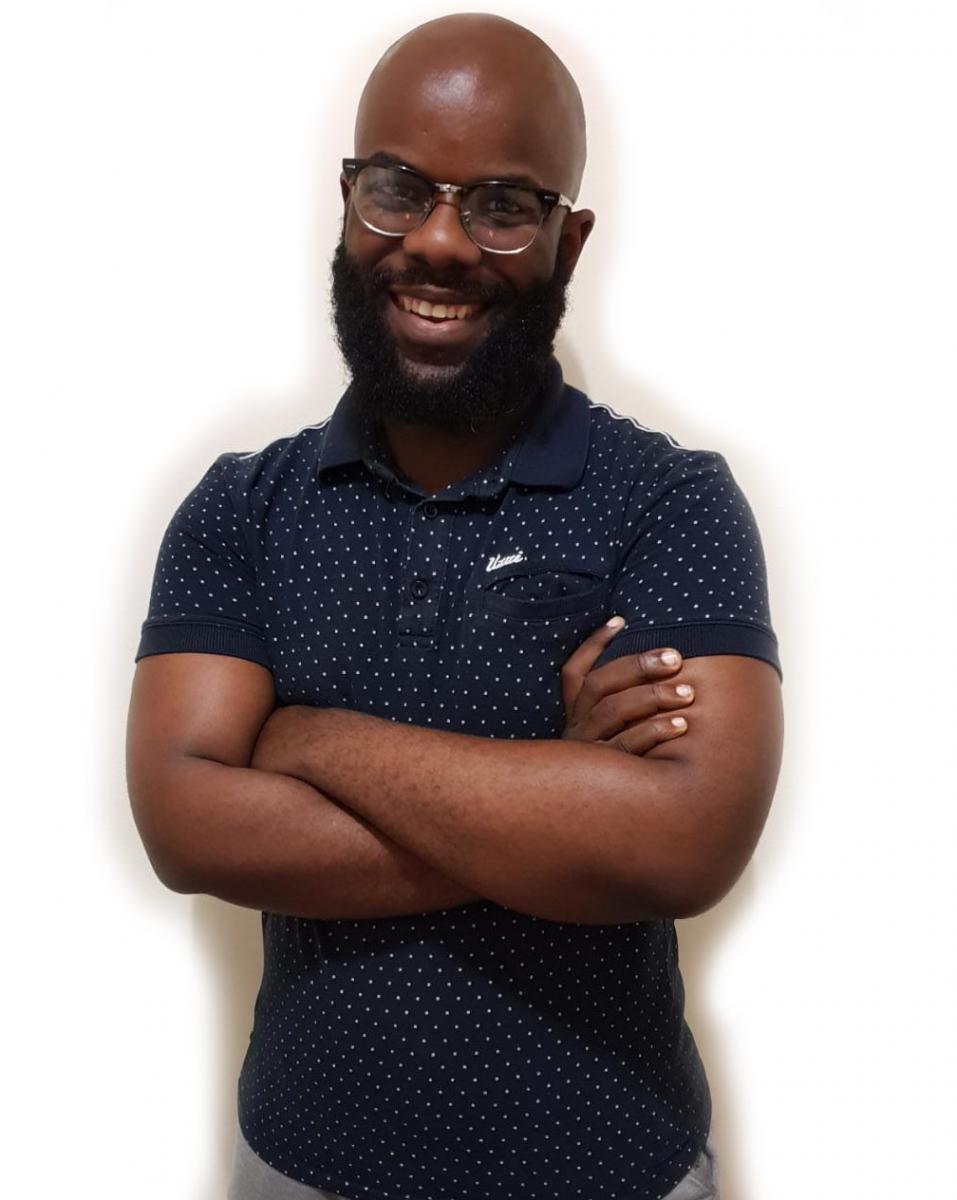
While youth unemployment remains a persistent concern in South Africa, the National Student Financial Aid Scheme (NSFAS) has partnered with the Unemployment Insurance Fund (UIF) to address the challenge.
The two institutions recently launched a graduate programme to give 50 unemployed graduates work experience in various fields for 12 months.
The successful applicants have been placed at NSFAS’s offices in the Western Cape.
NSFAS administrator, Dr Randall Carolissen, said the aim of the initiative is to address unemployment challenges facing the youth in the country, especially beneficiaries of the financial aid scheme.
“As NSFAS, we are at the forefront of addressing [students’] frustrations and are the first ones to see the impact that unemployment has on many graduates,” he said.
One of the 50 beneficiaries is Luchulumanco Nanto (24), who completed his National Diploma in Accounting at the Cape Peninsula University of Technology (CPUT) in 2018.
He said he found out about the programme through a social-media group that he belongs to on campus, on which he and fellow graduates share job opportunities.
“I am going to gain practical knowledge of what I have studied and this will also prepare me for the realities of a workplace environment,” said Nanto, who is now studying towards a BTech in Taxation at CPUT.
Nanto and his four siblings were raised by a single mother who could not afford to pay his university fees.
“My father passed away when I was just 10,” said Nanto, who hails from King William’s Town in the Eastern Cape.
Fortunately, he received a bursary from the State Information Technology Agency.
Nanto encourages young people to consider going through a graduate programme before applying for permanent jobs because it will enhance their skills and work ethic at the right pace while enjoying the benefits of being exposed to the world of work.
New Cabinet ready to serve
New Cabinet ready to serve vuyelwanOne by one, the country’s newly appointed 28 ministers and 34 deputy ministers vowed to respectfully serve the country as the sixth administration was sworn into office.
The incoming ministers and deputy ministers are part of a new Cabinet that for the first time features a 50/50 gender representation and many more youthful faces.
The reconfigured government departments are expected to help achieve the desires of South Africans.
The new Ministers and Deputy Ministers were sworn in by Chief Justice Mogoeng Mogoeng.
Public health facility to treat blood diseases
Public health facility to treat blood diseases vuyelwanFor the first time, South African citizens can be treated for blood-related diseases at a public health facility.
The recently opened Zakithi Nkosi Clinical Haematology Centre of Excellence specialises in treating aplastic anaemia, cancers of the lymph nodes, benign diseases of the blood and bone cancers like leukemia.
The centre, located at Chris Hani Baragwanath Academic Hospital in Soweto, can be used by patients from anywhere in the country who have been referred there for further treatment. It has 24 beds, 20 of which are in isolation wards. 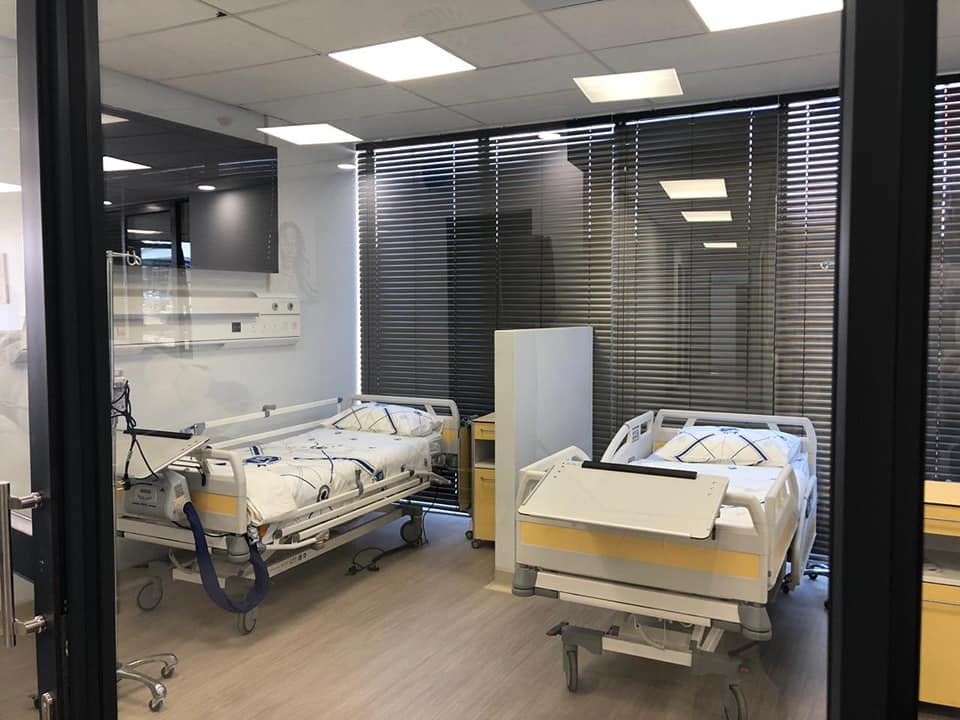
Head of the Clinical Haematology at the hospital Dr Moosa Patel said patients in the centre will receive the best care possible.
“We generally treat two types of diseases. One is the benign diseases, the non-serious diseases of the blood system. We deal with patients who have uncontrolled or abnormal bleeding and abnormal clotting.
“If you bleed too much, we have to investigate and treat you. If you clot very easily, we call it thrombosis and we also deal with that. That’s one group.
“The more severe group is the one that deals with the cancers of the blood, the leukaemias, lymphomas and myelomas. There the patients need chemotherapy, which is specialised treatment.”
Dr Patel added that non-cancer blood diseases such as anaemia are very common and can be treated by a general physician.
“The more serious diseases are the cancers of the blood. Those are dealt with by specialised haematology teams.”
Named after Zakithi ‘Zaza’ Nkosi, who died at the age of 19 from haemophagocytic lympho-histiocytosis, the facility was donated by her mom, businesswoman Daphne Mashile-Nkosi.
The grieving mother raised funds through the Stanley and Daphne Nkosi Foundation and the centre was built and equipped within a year.
QINA - building strong youth
QINA - building strong youth UrsulaA South African musical looks at the costs to young people of trying to be what they are not.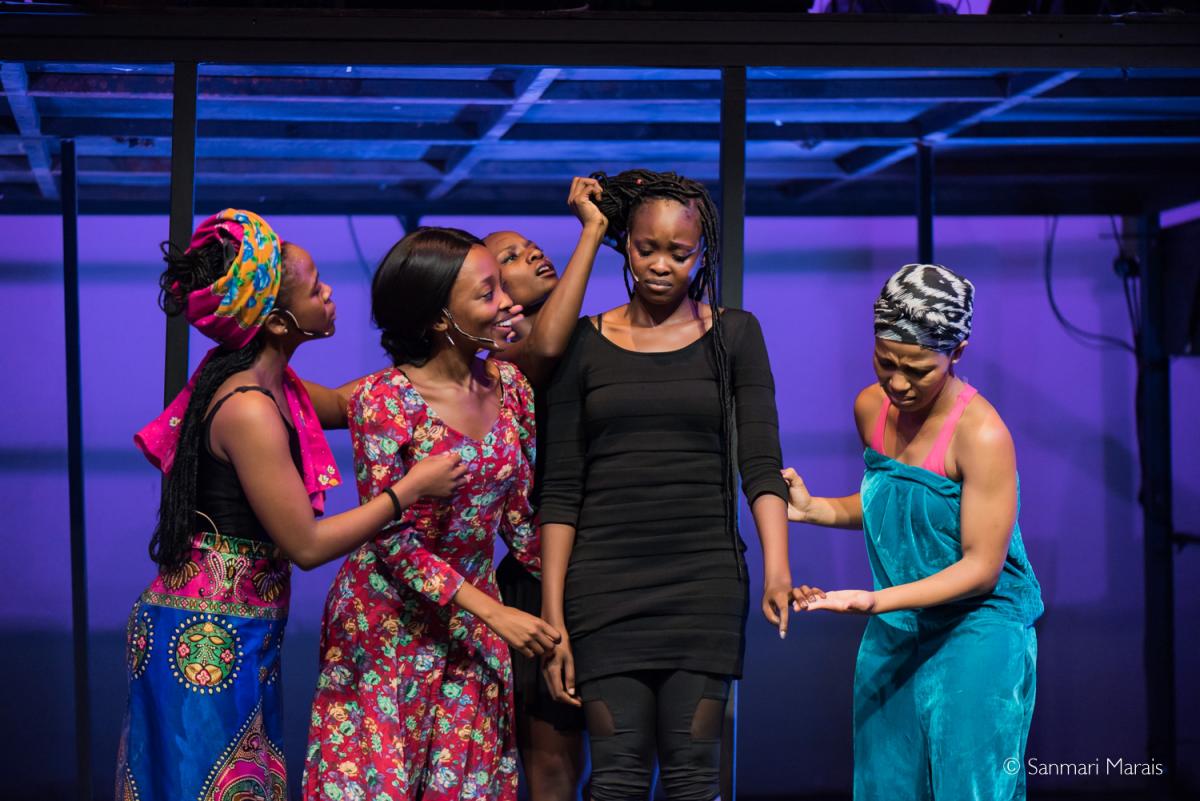
This Youth Month, the South African State Theatre presents the musical QINA, which tells a story of a young student who gets swallowed by the city while chasing his dreams.
QINA is a Zulu or Xhosa word that means ‘be strong’. This is an apt title for a show that looks at the depression suffered by many of the youth in South Africa today.
It will be showcased from 4 to 23 June at the State Theatre before it heads to the National Arts Festival in Makhanda in the Eastern Cape in July.
The play – which has thrilling choreography and afro backing sounds – depicts how a malicious girlfriend, a devious lecturer and fake friends nearly ruin the life of a young male student.
It aims to expose the good and the bad side of selfless love and how the practice of hypergamy (marrying a person of a superior class) contributes to patriarchy and gender-based violence.
QINA features performers Katlego Nche, Mpule Matlhola and Percival Moeketsi. It was written, directed and choreographed by Given Wiseman Chauke, whose potential was spotted during the State Theatre’s incubator programme in 2018.
Explaining what inspired him to tell such a story, Chauke said: “People are constantly depriving themselves of content and joyful lives by trying to please the world around them. The truth is, you cannot please everyone and you can’t ‘fit in’ everywhere, no matter how you try. It is better to be happy with yourself and be loved for who you are than to suffer for what you are not.”
Chauke was born and raised in Tembisa, where he started performing at the age of seven.
He also took drama classes at Bokamoso Secondary School, Sibikwa Saturday Arts Academy and Tswelopele Performing Artists where he learned acting, writing, directing, choreography and arts entrepreneurship.
During this time, he won several awards for excellence. In 2013, he enrolled for Musical Theatre at the Tshwane University of Technology.
Sozo Foundation gives hope to Cape Flats youth
Sozo Foundation gives hope to Cape Flats youth vuyelwanA guiding hand, the chance to learn a skill and be exposed to the workplace is transforming the lives of vulnerable youngsters in the Western Cape.
In 2010, husband and wife team Anton and Elana Cuyler traded in their jobs in England and moved to Cape Town to volunteer as youth workers at the Bay Community Church in Vrygrond – an area characterised by terrible living conditions, abuse, gangsterism and violence.
“We were moved by what we saw and decided to try and play a role in transforming the community,” said Anton.
This was the start of the Sozo Foundation, a non-profit organisation that today offers educational support, skills development, life skills training, nutrition and other services to thousands of children and youth in Vrygrond.
The centre of the foundation’s skills development initiatives is the Sozo Youth Café, where students are taught everything from graphic design, to hair and beauty, coffee-brewing, artisan skills and computer training. In 2018, 751 youth between the ages of 16 and 26 were trained at the Youth Café. Of the students who graduated, 83 percent were placed in employment, entrepreneurship or educational opportunities.
“Our goal is to see every student who graduates from the Youth Café finding employment, internships or enrolling for further studies,” said Elana.
After the training, students are sent for a week of job shadowing to get their first taste of the workplace.
“Most of our students have never had previous work experience. We have partnered with local businesses who help us facilitate the job shadowing process,” Elana explained.
After graduating from matric in 2016, Garrison Kivido was part of the first intake of Youth Café students in 2017. After going through the one-month life skills training programme at the café, he chose to continue on to the graphic design skills training programme.
“It was an enriching experience to meet people from different backgrounds and to learn about other students’ dreams and how we all had different talents and abilities,” said Garrison.
During the programme, Garrison discovered a passion for camera work and video editing, which was encouraged by his Youth Café mentor. When he graduated, he was immediately offered an internship at Media Village – a media production company in Muizenberg.
He went on to gain advanced skills in videography, editing and special effects, and has had the opportunity to work on movie sets.
Techie creates a world of wonder for learners
Techie creates a world of wonder for learners vuyelwanRural and township learners in the Free State are benefiting from the creative genius of 28-year-old Mbangiso Mabaso.
Mabaso is the founder of Sisanda Tech, which runs a project called SI Realities, a virtual science laboratory that uses enhanced virtual reality to make learning science easy, fun and engaging. The technology allows users to perform experiments using a smartphone.
Mabaso went to a township school and realised how not having access to an operating science lab set him back while studying electrical engineering at varsity. He was determined to help others in the same situation.
The self-taught app developer realised after designing his first game that there’s more to games than just playing. His first game, Eed, was created in 2015 and raised awareness about energy conservation. Eed came third in the SAB Kickstart Ignite competition, winning R100 000. It’s this experience that led to the development of the virtual science lab, said Mabaso.
“I thought to myself if the kids find a book boring and a game fun, why not fuse the two? The use of game mechanics makes learning fun. When a child is playing games, he could be eliciting things that he is not aware of and then using those lessons in the real world.”
Mabaso undertook many entrepreneurial projects before coming up with Sisanda Tech.
“When you get into entrepreneurship, it’s like entering a university of entrepreneurship where you’re going to write tests and fail. I have lost a lot of money in the process.
“My failures are my achievements, however, because I get to learn from those experiments,” he said.
Mabaso works with eight schools ranging from primary (grades 4 to 7) to high (grades 10 to 12) schools in Thaba Nchu and Botshabelo where he focuses on life science, natural science and technology and is planning to venture into mathematics.
“My philosophy in life relies on self-education. I believe when you match the information you get from school with self-education, it will turn into something.”
According to Mabaso, interest is the key to learning. “If you don’t have an interest in anything, you will never learn. I had an interest in developing games so eventually I learned how to do just that!” he said.
Teen joins the fight against crime
Teen joins the fight against crime tsoanaA Pretoria schoolgirl’s belief that fighting crime is the responsibility of young and old will motivate her as she helps lead one of the SAPS’s youth crime prevention flagship progra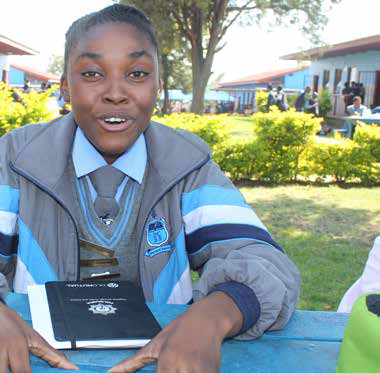 mmes.
mmes.
In February, Felistas Hamba (15) and the country’s other Junior Provincial Commissioners took part in a debate and public speaking competition that delved into the social ills facing schools. Hamba’s impressive performance saw her named the South African Junior National Police Commissioner.
Hamba’s team includes four deputy national commissioners, who come from the North West, Eastern Cape, Limpopo and KwaZulu-Natal.
It will be their mission to ensure that young people participate in making their schools and communities safer. “Crime affects us all. If you see a crime happening, please report it,” she called on her peers. “Making our schools safer starts with you.”
They will focus on physical bullying, crime prevention, gangsterism and cyberbullying.
Hamba decided to take part in the programme after realising that a lot of her peers didn’t know how to handle crimes that affect them. “As a young person, I am there to set a platform for them so that they can be change-makers for tomorrow,” she said.
The grade 10 pupil of DC Marivate Senior Secondary School in Soshanguve said innovative thinking by young people is needed to reduce crime in communities and at schools.
“Without young people leading this country, it will not go anywhere,” Hamba warned her peers.
Hamba’s dad is a police officer and it is her dream to follow in his footsteps.
The principal of Hamba’s school, John Mangezi, said her impact is positively influencing others in the school. “It’s very important for the school to have her in our midst because other learners want to be like her,” Mangezi said.
Young civil engineers pave the way for an exciting future
Young civil engineers pave the way for an exciting future JoyTwo young people are creating jobs for the youth, thanks to a loan from the Industrial Development Corporation (IDC).
The owners of the Maloka Machaba Surfacing, Kate Machaba and Matshela Maloka, have hired 28 people, most of whom are young, at their Polokwane-based asphalt business. Five of these are women.
Both civil engineers and both 32 years of age, they are passionate about being drivers of the economy.
Their business offers three main services: the manufacturing, surfacing and transporting of both hot and cold mix asphalt.
Hot mix asphalt is mainly used in the construction of tar roads while cold mix asphalt is mainly used to fix potholes. Both hot and cold mix asphalt are mixed at the company’s plant and come with a certificate of approval from civil engineering testing laboratory Mocha Labs.
Maloka, who is the chief executive officer of Maloka Machaba Surfacing, said a loan from the IDC helped them buy the specialised machinery needed to operate in the asphalt space, including trucks, pavers, rollers and distributors.
Applying for an IDC loan
The company’s loan application went through several processes at the business funding entity. Machaba, who is the chief operations officer, said they had to present a well-researched business plan when applying for the loan.
“Make sure that you have done your research thoroughly of the industry you want to get in to,” she said, adding that entrepreneurs should also remember that as a loan, the money has to be repaid.
Maloka Machaba Surfacing is on the road to success because of the leg-up it received from the IDC and after conquering South Africa, plans to expand north into other African countries.
Funding applications can be done on the IDC website or offices. Applicants are advised by the organisation to ensure the application has all the relevant documentation. When the IDC receives an application, it acknowledges receipt and may ask an applicant to supply extra information or documents.
The IDC then gives feedback on the outcome of an application in writing. If the IDC is satisfied with the business’ bona fides, an applicant is asked to sign a loan contract.
Young farmer sows seed for the future
Young farmer sows seed for the future angenithaSelf-determination is the driving force behind young Bloemfontein farmer Kanyi Gabiro who sells washed, chopped and packaged fresh fruit and vegetables, all of which she lovingly grows herself.
Her business, SA Fruition (Pty) Ltd, has been operating for six months, supplying its products to local businesses and individuals.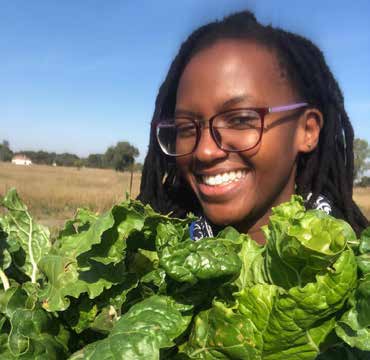
Gabiro (23) has a BSc (Hons) degree in Chemistry and is currently doing a MSc degree in Global Energy and Climate Policy through the University of London’s Oriental and African Studies centre.
When she decided to enter the agricultural industry, she set out to secure a voluntary internship. “I was willing to work for free to gain experience,” she said.
The experience of working with farm workers developed her ability to build with her hands and fix problems quickly. She also developed a tenacity to work for long hours in all weather conditions.
According to Gabiro, the sector has few female commercial farmers because of the perception that agriculture is labour intensive. “Of course, at the start-up level and to learn best practices one has to work in the field. But that does not mean one has to lift heavy loads with a spade or fork. Farming in the 21st century is mechanised." She started her business by tapping into her savings and loaning some money from her parents. Then she planted low-cost, high-demand vegetables.
Today, she grows peaches, spinach, spanspek, butternut, green beans, watermelons and beetroot.
With the high unemployment rate of young people, especially unemployed graduates, Gabiro is a firm believer that running a of business is a good way of creating an income.
“I would like to see more young people getting involved in agriculture, producing food and creating food security in South Africa,” she said.
“It is extremely rewarding for me to see a small seed that I planted go on to produce three watermelons. But most rewarding for me is making a sale and having financial independence,” she added.
Young scientist pays tribute to 1976 youth
Young scientist pays tribute to 1976 youth angenithaDr Pholoshi Maake (34) feels privileged to enjoy the fruits of the sacrifices made by the youth of previous generations, particularly the 1976 students who demanded better education for black people in South Africa.
Maake spoke to Vuk’uzenzele as South Africa commemorates Youth Month, with a specific focus on 16 June, also known as Youth Day. 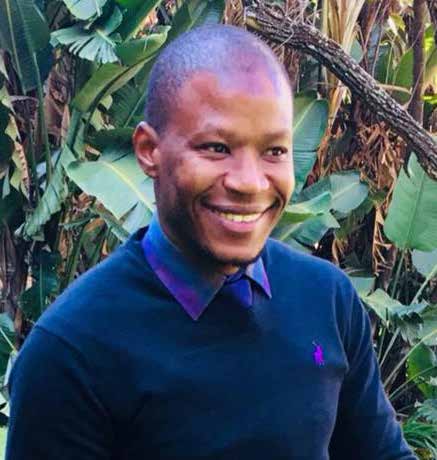
Youth Day and Month pay tribute to the over 20 000 school pupils from Soweto and other parts of the country, who began a protest march for better education in 1976. “Their sacrifices were not in vain. Because of what they fought and died for, I was able to complete matric, go to any university and study what I wanted. We have gained so much as a country because of what they stood for,” he said.
After completing matric at Mohwelere/Ga-Mashabela village in Limpopo where he was born and bred, Maake enrolled at the University of Limpopo for a Bachelor of Science degree, majoring in Zoology.
After obtaining his Master’s degree, he went on to complete his PhD in Ichthyology at Rhodes University in Makhanda in the Eastern Cape and became a professional taxonomist – a lesser known career that relates to the science of naming and classifying organisms.
From being trained as a fish taxonomist in his MSc and PhD, he joined the Agricultural Research Council as an acarologist, a formerly white dominated scarce skill in the country, where he remains the youngest and the only black acarologist amongst the five that are recognised across South Africa.
“No child living in apartheid South Africa could ever have imagined that a career like mine would be within their grasp,” he said thanking the generations that came before.
The only time that his parents paid for his university fees was when he was doing his first year. From then onwards, his hard work secured bursaries and scholarships.
His undergraduate and honours studies were paid through a bursary provided by the University of Limpopo, while his Masters was funded by the National Research Foundation and Ernst & Ether Trust.
He received a scholarship from the Department of Science and Technology that paid for his PhD, and another scholarship from Rhodes University that gave him an opportunity to spend a month in Belgium.
“Given our history, it was not easy for black students to get scholarships in South Africa and to easily get a passport to go spend a month in Belgium for education purposes,” he said.
Today, he works as a senior scientist for animal species information under the Zoological Systematics and Collections at the South African National Biodiversity Institute.
Some of his biggest achievements, apart from his academic accolades, include being invited to give lectures at the University of Limpopo and Sol Plaatjie University in 2017.
He also supervises two young academics whom he assisted in obtaining funding for their studies.
He said he wishes more young people from township and rural communities would make good use of the opportunities before them, especially education opportunities because they were earned through tears, sweat and blood.
